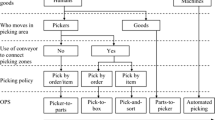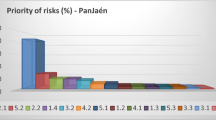Abstract
Within supply chains planning and scheduling tasks are spread across several companies and over several hierarchically levels. But the main scheduling direction is top down which means that reactive scheduling in the case of disturbing events is not supported on all scheduling levels of the supply chain. To support a reactive scheduling process in the supply chain this paper presents a concept of vertical data integration using basic data from shop floor to generate events useful in scheduling decisions on higher levels.


Similar content being viewed by others
References
Arangu M, Garrido A, Onaindia E (2008) A general technique for plan repair. In: 20th IEEE international conference on tools with artificial intelligence. ICTAI 08, pp 515–518
Bloomberg DJ, Lemay S, Hanna JB (2002) Logistics. Prentice Hall, Englewood Cliffs
Cushing W, Kambhampati S (2005) Replanning: a new perspective. In: Poster, ICAPS 2005
Dorn J (2004) Evaluating reactive scheduling systems. In: Proceedings of the IEEE/WIC/ACM international conference on intelligent agent technology (IAT04). IEEE, New York
Fox M, Gerevini A, Long D, Serina I (2006) Plan stability: replanning versus plan repair. In: Proc of ICAPS 2006, pp 212–221
Henseler H (1994) From reactive to active scheduling by using multi-agents. In: Kerr RM, Szelke E (eds) IFIP TC5/WG.5.7 second international workshop on knowledge based reactive scheduling (KBRS) PREPRINTS, Budapest
Henseler H (1995) REAKTION: A system for event independent reactive scheduling. In: Kerr RM, Szelke E (eds) Artificial intelligence in reactive scheduling. Chapman & Hall, London
Kletti J (2007) Manufacturing execution system—MES. Springer, Berlin
Kerr RM, Szelke E (1995) Artificial intelligence in reactive scheduling. Chapman & Hall, London
Lim A, Rodrigues B, Zhu Y (2005) Airport gate scheduling with time windows. Artif Intell Rev 24(1):5–11
Luethi M, Weidmann U, Laube F, Medeossi G (2007) Rescheduling and train control: a new framework for railroad traffic control in heavily used networks. In: 86th transportation research board annual meeting 2007
Pinedo ML (2005) Planning and scheduling in manufacturing and services. Springer, Berlin
Pinedo M (1995) Scheduling. Prentice-Hall, Englewood Cliffs
Peiffer A, Kadar B, Monostori L (2007) Stability-oriented evaluation of rescheduling strategies, by using simulation. Comput Ind 58:630–643
Sauer J, Appelrath H-J (2003) Scheduling the supply chain by reams of agents. In: Sprague RH (ed) Proc of the 36rd Hawaii international conference on system sciences (HICSS-36). IEEE Computer Society, Los Alamitos
Sauer J (2004) Intelligente Ablaufplanung in lokalen und verteilten Anwendungsszenarien. Teubner, Leipzig
Sauer J (2006) Modeling and solving multi-site scheduling problems. In: Wezel WV, Jorna R, Meystel A (eds) Planning in intelligent systems: aspects, motivations and methods. Wiley, New York, pp 281–299
Sauer J, Huang J, Zou L (2008) Nutzung von Präferenzen bei der Planung variantenreicher Produktion. In: Mönch L, Pankratz G (eds) Intelligente Systeme zur Entscheidungsfindung, Teilkonferenz der Multikonferenz Wirtschaftsinformatik 2008. SCS Publishing House, Sydney, pp 67–81
Stadtler H, Kilger C (2002) Supply chain management and advanced planning, vol 2. Springer, Berlin
Smith SF (1994) OPIS: A methodology and architecture for reactive scheduling. In: Zweben M, Fox MS (eds) Intelligent scheduling. Morgan Kaufman, San Francisco, pp 29–66
Silva L, Pereira HA, Pereira WM Jr (2006) Reactivity-based scheduling approaches for internet services. In: Proceedings of the fourth Latin American web congress (LA-WEB 06). IEEE, New York
Vonder SVD, Ballest F, Demeulemeester E, Herroelen W (2007) Heuristic procedures for reactive project scheduling. Comput Ind Eng 52:11–28
Vieira GE, Herrmann JW, Lin E (2003) Rescheduling manufacturing systems: a framework of strategies, policies, and methods. University of Maryland, Maryland
Author information
Authors and Affiliations
Corresponding author
Rights and permissions
About this article
Cite this article
Sauer, J. Vertical Data Integration for Reactive Scheduling. Künstl Intell 24, 123–129 (2010). https://doi.org/10.1007/s13218-010-0025-3
Received:
Accepted:
Published:
Issue Date:
DOI: https://doi.org/10.1007/s13218-010-0025-3




